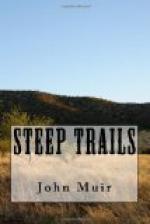As early as 1843, while the settlers numbered only a few thousands, and before any sort of government had been organized, they came together and held what they called “a wolf meeting,” at which a committee was appointed to devise means for the destruction of wild animals destructive to tame ones, which committee in due time begged to report as follows:—
It being admitted by all that bears, wolves, panthers, etc., are destructive to the useful animals owned by the settlers of this colony, your committee would submit the following resolutions as the sense of this meeting, by which the community may be governed in carrying on a defensive and destructive war on all such animals:—
Resolved, 1st.—That we deem it expedient for the community to take immediate measures for the destruction of all wolves, panthers, and bears, and such other animals as are known to be destructive to cattle, horses, sheep and hogs.
2d.—That a bounty of
fifty cents be paid for the destruction of a
small wolf, $3.00 for a large wolf,
$1.50 for a lynx, $2.00 for a
bear and $5.00 for a panther.
This center of destruction was in the Willamette Valley. But for many years prior to the beginning of the operations of the “Wolf Organization” the Hudson’s Bay Company had established forts and trading stations over all the country, wherever fur-gathering Indians could be found, and vast numbers of these animals were killed. Their destruction has since gone on at an accelerated rate from year to year as the settlements have been extended, so that in some cases it is difficult to obtain specimens enough for the use of naturalists. But even before any of these settlements were made, and before the coming of the Hudson’s Bay Company, there was very little danger to be met in passing through this wilderness as far as animals were concerned, and but little of any kind as compared with the dangers encountered in crowded houses and streets.




